10+ Sample Strategy
-
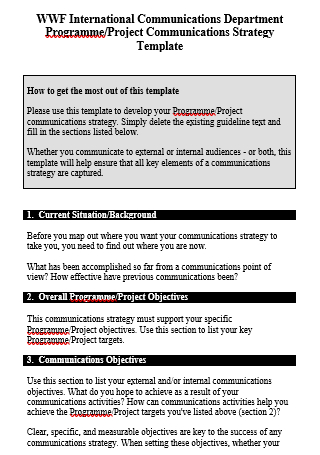
Project Communications Strategy Template
download now -

Intervention Strategy
download now -
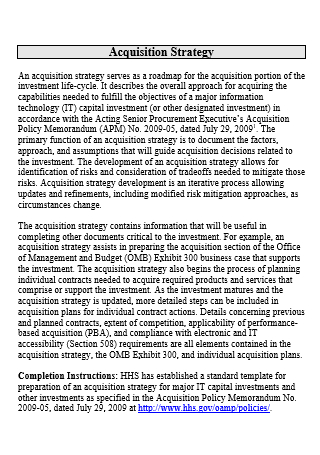
Acquisition Strategy
download now -
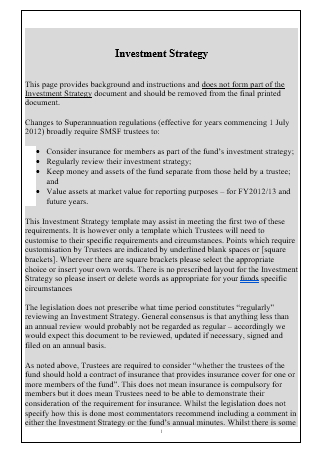
Investment Strategy
download now -

Sampling Strategy and Design
download now -
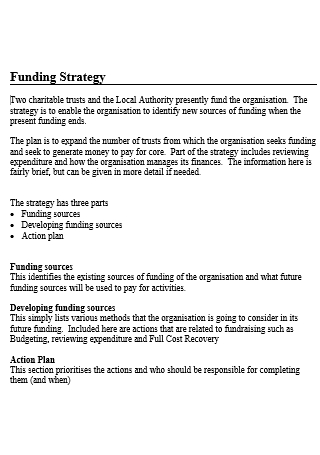
Funding Strategy
download now -
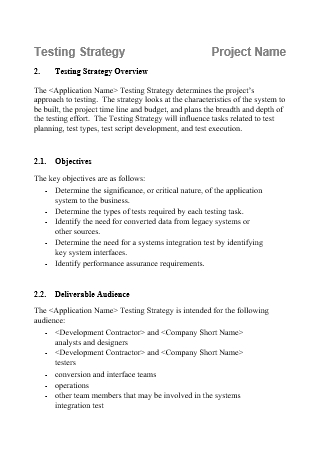
Testing Strategy
download now -

Instructional Strategy Demonstrated
download now -

Communications Strategy and Budget
download now -
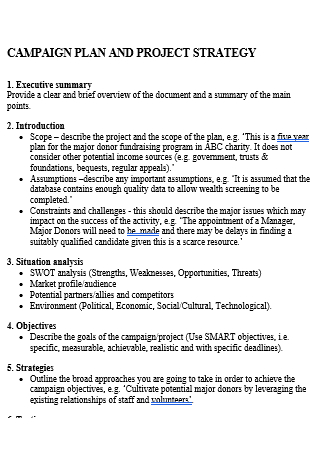
Campaign Plan and Project Strategy
download now -
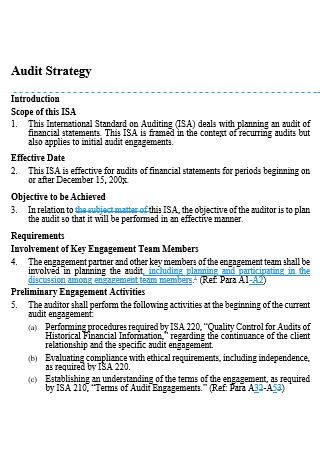
Sample Audit Strategy
download now
What Is a Strategy?
In business, achieving a lofty objective is not simple. A company can achieve its goals regardless of the circumstances and even when faced with uncertainty if it has an excellent strategy. The best you can do for your business is to include a general business strategy in your business plan. This is because the process you’ve developed will help your business overcome all the obstacles and setbacks it will face. Remember that your strategy must be appropriate for your business type; otherwise, it will never succeed. Numerous studies have concluded that up to 67 percent of strategic planning is unsuccessful. This is partly because the conventional approach to strategic planning is entirely backward.
Benefits of Strategic Planning
Although many organizations recognize the significance of strategic planning and spend a great deal of time and money developing a strategic plan, it is often reviewed only once a year or, even worse, becomes a glossy document that sits on a shelf. You may be wondering whether a strategic planning process is worthwhile. There are numerous advantages associated with strategic planning. The key to effective strategic planning is incorporating measures and implementation steps that allow you to engage your staff and regularly monitor the results. Strategic planning does not end with the strategic plan but is a beginning! Here are the five most significant advantages of strategic planning:
Tips to Make a Business Grow
To be successful in business today, you need to be able to change and be good at planning and staying organized. Many people start a business thinking they can turn on their computers and begin making funds, only to find out that it’s much more complicated than they thought to make money in a business. This won’t happen if you take your time and plan out all the actions you need to take to be successful in your industry. No matter what kind of business you want to start, the nine tips below can help you make it a success.
1. Get Organized
To achieve business success, you must be organized. It will assist you in completing tasks and remaining organized. The best habit to stay calm is to create a daily to-do list. As you finish each job, mark it off your list. This will ensure you don’t forget anything and complete all the essential tasks for your business’s survival. There are numerous software-as-a-service (SaaS) tools for increasing organization. Newer additions include Slack, Asana, Zoom, Microsoft Teams, and others. Consequently, a simple Excel spreadsheet will satisfy most of an organization’s needs.
2. Maintain Detailed Records
All prosperous businesses maintain detailed records. By doing so, you will be aware of the financial status of the company and any potential obstacles it may face. Knowing this alone gives you time to devise strategies to overcome these obstacles. Most organizations maintain two records: one physical and one in the cloud. A business no longer needs to worry about losing data by having uploaded and backed-up documents. The physical form exists as a backup but is often used to verify the accuracy of the other information.
3. Analyze Your Rival Companies
Competition produces the best outcomes. To achieve success, you must observe and learn from your competitors. After all, they may be doing something profitable that you can incorporate into your business. How you analyze competition varies by industry. If you are a restaurant owner, you may be able to gather information simply by dining at your competitors’ establishments and asking other patrons what they think. Alternatively, you could be a chemical company with minimal access to your competitors. In such a case, you would collaborate with a business expert and accountant to review how the business presents itself to the world and any financial information you can obtain about the company.
4. Be innovative
Always look for ways to improve your business and set it apart from the rest. Recognize that you don’t know everything, and be open to new ideas and practices to run your business. There are a lot of different ways to make more money. Amazon is a good example. The company began as a bookstore and grew into a substantial online business. Few people thought Amazon’s Web Services division would be one of the most significant ways it makes money.
5. Provide Great Service
Numerous prosperous businesses disregard the importance of providing excellent customer service. If you provide superior service to your customers, they will be more likely to pick you over your competition the next time they require a product or service. In today’s hyper-competitive business environment, the level of service provided by a business is frequently the determining factor between success and failure. This is where the adage “underpromises and overdeliver” comes into play, and astute business owners would be wise to adhere to it.
6. Be Ready to Offer Sacrifices
The steps leading up to opening a business are arduous, but the work does not end once the doors are open. In many instances, you must invest more time than you would if you were working for someone else, which may require you to spend less time with your family and friends. The adage that business owners have no weekends or vacations may ring true for those who are dedicated to the success of their enterprise. Full-time employment is wrong, and some business owners underestimate the sacrifices necessary to launch and maintain a profitable business.
How to Build a Business Strategy
Developing a strategy can assist you in achieving both your short- and long-term objectives. The strategy focuses on principles, which help you think, as opposed to tactics, which help you execute, enabling you to focus on why your business engages in certain activities, as opposed to just how or what it does. Read on to find a business strategy and how to create one immediately. Your business strategy should be based on your company’s overall vision statement. For some brands, global market expansion will be the objective. For some, increasing their investments in existing, profitable markets may be essential. Creating an effective business strategy requires prior research regardless of your ultimate objectives.
Step 1: Determine your company’s goals and values
Traditional goal setting in business lets you measure what you do, but it doesn’t help you estimate how or why you do it. And if you only look at the results, you might be more likely to do something that puts your organization’s needs ahead of your customers. When building your business strategy, think about setting and anchoring to your vision for your business in the future. This will let you concentrate on your purpose and process than your results. It will also motivate you to do work that better serves your customers. Once you set an anchor for an aspiration, you can add your goal to the equation. This will help you do customer-focused work and hit your numbers simultaneously.
Step 2: Conduct a self-evaluation
Once you’ve determined your business goals and values, it’s time to conduct an annual self-assessment to help you choose the best business development and success paths. You can accomplish this by conducting a SWOT analysis to determine your company’s strengths, weaknesses, opportunities, and threats. What are your strengths, and how will you capitalize on them? What can be made better, and how?
Step 3: Determine which market segments you wish to capture
Your product or service probably isn’t the best fit for the entirety of your market, so it’s essential to identify the market segment or segments that benefit the most from your offering. Customers who genuinely require and desire your product or service are also the most loyal and least likely to churn, increasing your lifetime value and decreasing customer acquisition costs.
Step 4: Establish distinct objectives and create a plan
Now that you have finished your analysis and developed a vision for your business, it is time to establish objectives. Consider the desired outcome and work backward to determine the necessary steps. Setting business objectives will help guide your strategy and departmental collaboration to achieve your goal. In addition, it’s time to develop a strategy for reaching your business objectives now that they’ve been identified. This plan should include tasks that your team can execute and outline the steps necessary to accomplish your mission or goal. This plan can be implemented as either a short-term or a long-term strategy, or both. Additionally, you will need to review your plan frequently to ensure that everything remains on track and make adjustments as the business requires.
Step 5: Determine the skills needed to beat the competition and grow your business
Unfortunately, passion alone cannot propel you to the top of your industry and defeat your competitors. Talent and skill are equally essential. Depending on your aspirations, goals, and market, you must determine which types of teams and employees you must cultivate and recruit to outperform your competitors and sustain your success. To achieve your objectives, you may need to hire more engineers or a data science team with experience in your industry.
Step 6: Determine which management systems are needed to sharpen these skills and measure results
If your organization is a team, your managers are the coaches. They are accountable for developing, supporting, and motivating employees to perform their best work. Establish check-ins with your team to guarantee that employees and managers have the resources necessary for success. Invest in technology that lets your team collaborate more effectively and advances your business objectives. Because your employees will never reach their full potential and, in turn, help the business reach its full potential if they do not develop the necessary skills and discipline to compete and succeed. Also, it is insufficient to set goals and hope for the best simply. If you wish to attain greatness, you will need to monitor your progress actively. As previously stated, you should check your plan monthly to ensure everything operates as intended. Verify that your team is meeting key performance indicators by evaluating your metrics (KPIs). Find out why they are not meeting them and devise a plan to get things back on track.
FAQs
Why is business strategy important?
Leaders can better identify their strengths and weaknesses when developing a strategy. This allows them to capitalize on their strengths and strengthen their weaknesses. It ensures that all aspects of an enterprise are planned. This entails greater effectiveness and more efficient and effective planning.
How do you write a business strategy statement?
The statement includes three elements: objective, scope, and competitive advantage. Each of the three elements must be expressed as precisely as possible. A well-written strategy statement will assist employees, and the organization understand their roles in the strategy’s execution.
What is strategy structure?
The strategic structure would be the relationships between the various strategic elements. You have developed objectives if you have a list of goals, including SMART goals, but you may not have a structured strategy.
Creating a successful business strategy requires time, so you should begin now. According to data, approximately 20% of new companies fail within the first two years, 45% within the first five years, and 65% within the first ten years. 25% of new businesses survive for 15 years or longer. Feel free to download any examples above that you believe will assist you in writing your effective business strategy.
